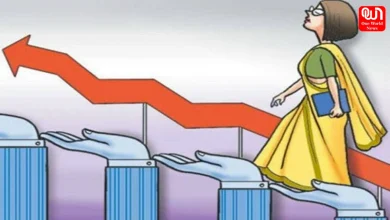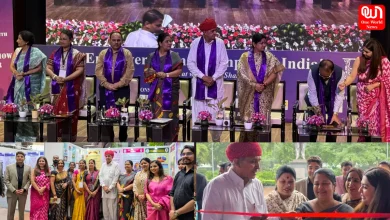Gulmeher: A Women’s collective turning waste pickers to artisans

A Women run organisation making eco-friendly products using recycled products and waste flowers
Passing by one of the largest garbage dumps of the country, Ghazipur, a 65 meters tall garbage dump, there blooms a women’s collective of waste-pickers turned artisans called Gulmeher.
Gulmeher (literally, “blessings of the flowers”) was born out of a desire to improve the livelihoods and quality of life of the 350 waste-picker households in the slum, focused on initiating alternative income generation. In an endeavour to provide customers with handcrafted products while supporting and encouraging craftsmanship – skilled designers train Gulmeher women to handcraft each product using flower petals arranged together to breathe life into the designs. Gulmeher started off as a social entrepreneurship initiative, aimed at Recycling, Reducing, Reusing, Repairing, Re-gifting and Recovering waste.
Kamla Ji, the Centre Incharge of Gulmeher, Delhi said, “at Gulmeher, we have worked with more than 200, of which many have experienced working as rag pickers at Gazipur while some are local women who look out for livelihood. We started working from 2013 with providing livelihood and then have expanded to providing education facilities to the children of these women too. We make several products and seasonal handicrafts. We are generally skilled to make eco-friendly products using recycled products and eco-friendly flowers”.
The director of Shakti Foundation, Mr Anurag Kashyap said, “Gulmeher was intended to eventually be a self-sustainable entity with the shareholders (erstwhile waste-pickers, who we would rather call green workers) appointing staff like a CEO, marketing manager, production manager etc. to manage the entity. We recognize that that objective is still some distance away, but we’re striving towards it. Currently, the revenues of Gulmeher are from the sale of festival products like natural Holi colours, earthen diyas, rakhis, stationery items like calendars, notebooks, pens, and eco-friendly gifting items like customized boxes, bags, portraits etc.
A group of women have been trained on stitching machines, and they are capable of making quality cloth bags, masks etc.”
Read more: Atulyakala: A design house fully run by Deaf Artists
About shakti Foundation
Shakti Foundation is a registered not-for-profit entity incorporated to provide shakti (energy) to people and children to better the quality of their lives. Shakti Foundation focuses on waste management, alternative livelihoods, financial inclusion, remedial education and caring for children with special needs. Relief work, though not a separate function, forms a vital part of Shakti’s activities (as a response to COVID, they had raised funds and distributed food rations for more than 5000 families and migrant workers in April-July).
Mr Kashyap when asked about his vision on expanding the initiative, he said that “they are planning to establish at least two new centres for children with special needs. Chandigarh would be the first place outside Delhi that we would start. Foray into waste collection/segregation- we have already commenced work in Delhi on this, and would be expanding on this initiative to include plastic waste recycling and in other cities. The objective would be two-fold: environmental as well as social/economic to benefit the waste-pickers. Organize waste-pickers under the Shakti/Gulmeher initiative and establish resource centres in different parts of the country where the focus is not just on livelihoods, but also on financial inclusion, health, education (for their children)”
Amid the lockdown, Kamla Ji told that “earlier their centre was closed in the initial days and all the women were having a hard time managing themselves financially. Most of these women live in the slums opposite to the kuda dan and livelihood was becoming a problem then we received a bulk order for facemasks and we got back to work. We were even supported by Shakti Foundation with food and ration. Here, a group of women have been trained on stitching machines, and they are capable of making quality cloth bags, masks and we distributed nearly 30,000 masks to frontline workers in May-June and sold another 40,000. Another group of women is making recycled paper bags for large retail stores to replace plastic bags. Last year, more than 150,000 paper bags were ordered by a leading store, Relay, at all the leading airports in the country, which helped immensely.”
Gulmeher had to overcome significant challenges including mobilization, training the women, quality issues and finding a market for various products. The collective has incorporated the Gulmeher Green Producers Company (GGPC), with women waste-pickers as shareholders. Yet, Kamla ji says, “Gulmeher has brought significant changes in the lives of these women from when they had come here to what they are now, they feel empowered and self-sufficient.”
Have a news story, an interesting write-up or simply a suggestion? Write to us at info@oneworldnews.co







